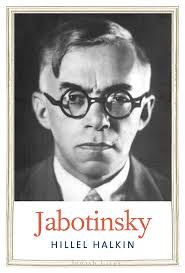 Hillel Halkin, Jabotinsky: A Life (New Haven, CT: Yale University Press, 2014). Hardcover / Kindle
Hillel Halkin, Jabotinsky: A Life (New Haven, CT: Yale University Press, 2014). Hardcover / Kindle
One day, while I was waiting for my chai latte at the café, a friend noticed Hillel Halkin’s book in my hand and asked, “Who is Jabotinsky?” I should note that my friend is given to reading obscure books by obscurer theologians. But he joked that I had “out-obscured” him this time with my choice of reading.
So, who is Jabotinsky? Why is he worth reading about, especially if you, like me, are a Gentile Christian reader?
The answer to both questions is straightforward: Vladimir “Ze’ev” Jabotinsky (1880–1940) was the founder and leader of Revisionist Zionism. He is worth reading about because of his influence on the Israeli Right, including Menachem Begin, Israel’s first Likud prime minister, and Benjamin Netanyahu, its current Likud prime minister. (Netanyahu’s father, Ben-Zion, was an aide to Jabotinsky.) And his form of Zionism complicates American Christian support for Israel in interesting ways.
That last point requires explication. Christian Zionists typically believe that the re-establishment of the State of Israel in 1948 was the fulfillment of biblical prophecy. But the Zionists whose labors brought this about were not particularly observant Jews. (Religious observant Jews in Israel today tend to lean Right, often forming political alliances with Likud.) Moreover, they vigorously disagreed—occasionally to the point of physical fights—on political and military means and ends.
The dominant form of Zionism in the early years was Socialist and largely secular, the predecessor of today’s Israeli Left. (For anticommunist American Christians, this is always something of a surprise.) They tended to think peace with the Arabs was possible and often agreed with the various partition plans (prior to 1948) of the League of Nations and its successor, the United Nations. Revisionists, on the other hand, prepared for battle from the get-go and were territorial maximalists. What united Left and Right was the dream of a Jewish nation in its historic homeland. To a certain extent, they collaborated as the British Mandate in Palestine wound down after World War II and then in the War for Independence against the Arabs. But that collaboration, rare before Independence, rare after it, was tactical rather than strategic. The divisions between Left and Right were bitter in Jabotinsky’s day. They have not become sweeter since. Jabotinsky was denounced by the Zionist Left as a “fascist,” a canard that is regularly applied by the Israeli Left to the Israeli Right in the present day, applied more generally to all Israelis by anti-Semitic streams in Europe and the Arab world.
I mention these things because Christian Zionists often have an uninformed view of Israeli history. I have met many sincere Christians who think they can skip directly from biblical Israel to modern Judaism, seemingly unaware of both the evolution of the religion of Hebrew Scriptures into rabbinic Judaism and of the prevalent secularism of Zionism in its earliest forms. (They are really shocked when they discover that some ultraorthodox Jews are not even Zionists at all!) Christian support for Israel should not be informed by such errors. If you’re going to support the nation, at least understand its history correctly.
There is another reason to read this book, however—aside from the light it will shed on a crucial chapter in Zionist history. That reason is the intrinsic interestingness of Jabotinsky’s life. He was born in Odessa, Russia. Odessa was a relatively new city, filled with all sorts of ethnic and religious minorities. While many other Russian and Eastern European Jews experienced pervasive discrimination, Jabotinsky grew up in a relatively liberal environment. He wasn’t a resident of the shtetl, he was a cosmopolitan. He didn’t become a Zionist out of a reactive mechanism of self-defense. He chose to become one.
Hillel Halkin pays particular attention to the cosmopolitan side of Jabotinsky’s personality through close and regular attention to his journalism, short stories, poems, books, and plays. The Russian author Alexander Kuprin once told a Jewish audience that Jabotinsky had “a God-given talent who could have been an eagle of Russian literature had you not stolen him from us” and drawn him into Zionist political activity. Kuprin went on to say, “What a great loss to Russian literature, only a few of whose writers have been blessed with his style, his wit, his insight into our soul!” Jabotinsky was educated, well traveled, fluent in several languages, and a man of letters who settled into politics, lured by the necessities of his age.
His life should not be reduced to politics, as important as they were to him and as enduring as his political legacy may be. No one’s life should be. The personal is always more than—and more interesting than—the political, even in the life of a man who gave himself to politics for the sake of Zion.
P.S. If you found this review helpful, please vote “Yes” on my Amazon.com review page.
P.P.S. You might also want to check out Menachem Begin by Daniel Gordis. (See my review here.)

